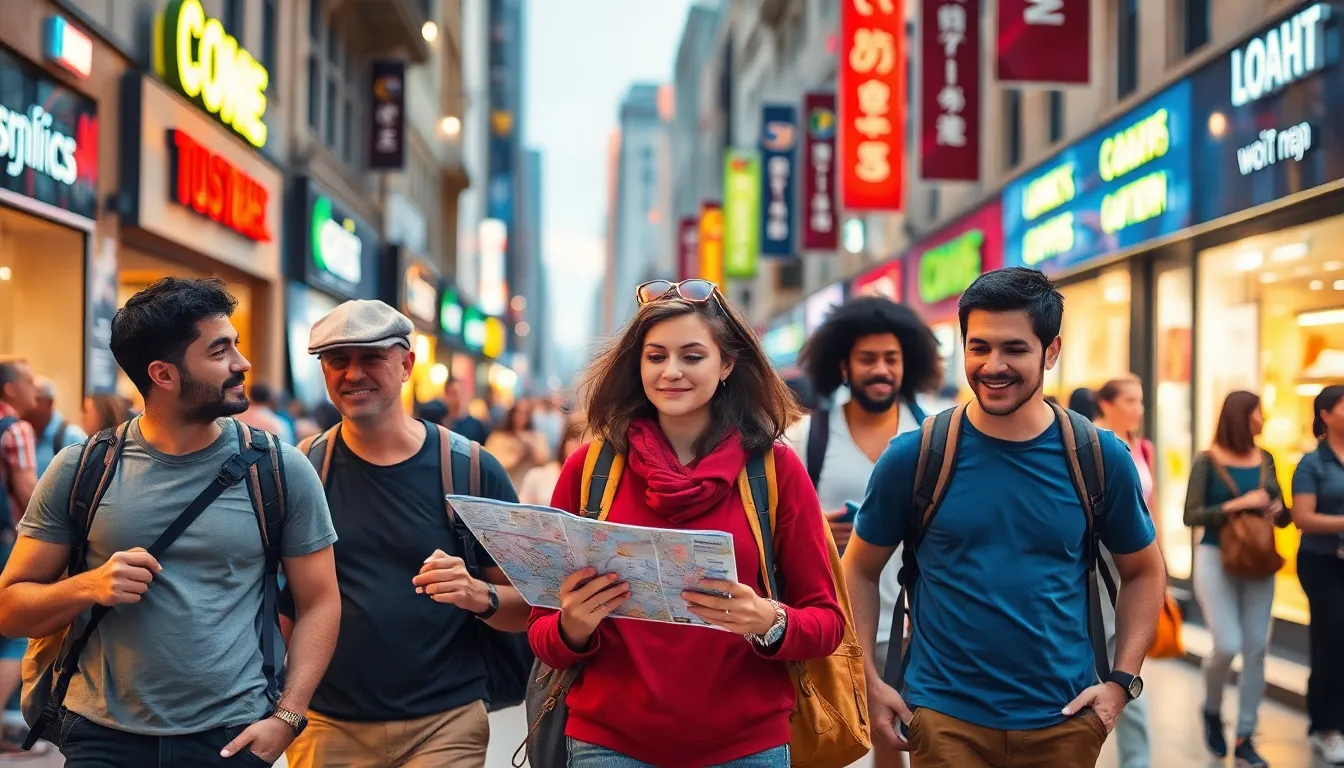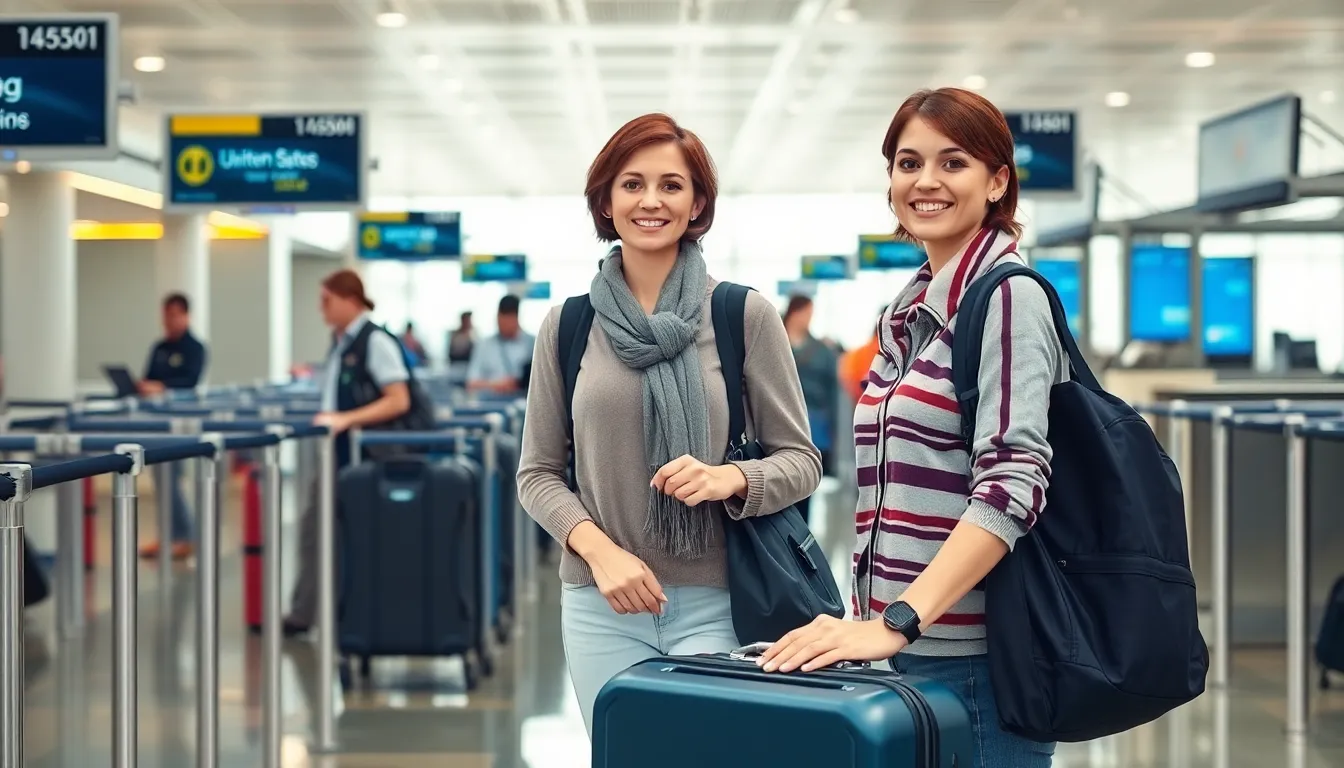Traveling can be a thrilling adventure, but it often comes with its fair share of worries—like keeping your belongings safe or navigating the maze of airport security. With the world becoming more unpredictable, understanding travel security measures isn’t just smart; it’s essential. Think of it as your trusty sidekick, ready to swoop in and save the day when things get dicey.
From mastering the art of packing light to knowing how to spot a suspicious character in the crowd, these measures can transform a potential travel nightmare into a smooth, stress-free journey. So grab your passport and buckle up; it’s time to dive into the world of travel security. After all, a little preparation goes a long way, and who wouldn’t want to travel like a pro?
Table of Contents
ToggleOverview of Travel Security Measures
Travel security measures ensure safety during all stages of a journey. They encompass various practices aimed at protecting personal belongings and maintaining traveler well-being. Proper awareness of potential risks contributes to a secure travel environment.
Securing personal belongings represents a top priority. Travelers should use strong, lockable luggage and keep valuables in carry-on bags. In crowded areas, shoulder bags with zippers can minimize theft risks.
Airport security processes often cause concern. Familiarity with regulations reduces stress while traveling. Following guidelines for carry-on items helps speed up security checks. Many travelers recommend wearing easily removable shoes to facilitate quick passage through screening.
Recognizing suspicious behavior enhances security awareness. Familiarity with one’s surroundings allows travelers to detect irregularities. Observing people who seem out of place increases vigilance and can prevent potential issues.
Staying informed about destination safety ratings plays a critical role in trip planning. Websites or government resources highlight areas of concern, enabling travelers to avoid unsafe regions. Understanding local customs and laws contributes to a smooth travel experience.
Emergency preparedness must not be overlooked. Carrying a list of emergency contacts ensures quick communication during unexpected situations. Many experts emphasize the importance of knowing the location of nearby embassies or consulates for added security.
Lastly, using technology for security purposes can streamline travel. Smartphone apps designed for navigation, emergency alerts, and language translation help travelers manage risks effectively. Utilizing these tools can enhance the overall travel experience.
Importance of Travel Security

Travel security significantly enhances the overall experience by reducing anxiety and preventing incidents. Proper measures safeguard both personal safety and valuable belongings.
Protecting Personal Safety
Prioritizing personal safety ranks high among travel considerations. Awareness of surroundings helps identify potential threats. Travelers often benefit from sticking to well-lit areas and avoiding secluded places. Familiarity with local emergency contact numbers provides peace of mind. Researching the safety ratings of destinations beforehand can inform choices. Engaging with locals can also lead to useful safety tips. Establishing a trustworthy communication system with family or friends adds an extra layer of security. With these precautions, travelers can navigate their journeys confidently.
Safeguarding Valuables
Safeguarding valuables remains crucial while traveling. Using strong, lockable luggage deters theft and provides security for personal items. Carrying essential valuables in a personal bag ensures easy access and reduces risks. Employing anti-theft bags that feature locking mechanisms enhances protection. Keeping digital copies of important documents simplifies loss recovery. Utilizing hotel safes allows travelers to store valuables securely away from sight. Regularly checking belongings during transit promotes accountability. By being proactive, travelers can minimize losses and maintain peace of mind throughout their journey.
Common Travel Security Threats
Travelers face various security threats that can impact their journey. Understanding these common threats allows for better preparedness.
Theft and Pickpocketing
Theft and pickpocketing rank among the most prevalent issues during travel. Crowded places, like markets and public transportation, often attract thieves. Travelers should stay vigilant and keep valuables in secure locations. Using a money belt or hidden pouch serves as a practical solution. Keeping bags close and zipped reduces the chances of theft. Noticing suspicious behavior, such as someone getting too close, can help identify potential threats. Observing local trends in crime can also offer insights into safer practices. Taking these precautions minimizes risk and enhances the overall travel experience.
Scams and Fraud
Scams and fraud present significant hazards for travelers. Various scams, such as fake taxi services or misleading tour packages, often target unsuspecting individuals. Asking for recommendations from trusted sources mitigates potential issues. Checking online reviews before selecting services can reveal red flags. Recognizing typical scams, like overcharging or unnecessary services, plays a crucial role in protection. Also, being cautious with personal information when approached by strangers is vital. Travellers must remember that staying informed about common scams in their destination empowers them to avoid harm.
Essential Travel Security Measures
Travel security measures play a crucial role in enjoying a safe journey. Implementing effective strategies mitigates risks and enhances overall safety.
Pre-Trip Preparations
Prioritizing pre-trip preparations ensures a smoother travel experience. Researching destination safety ratings informs travelers about local risks. Creating a list of emergency contacts, including nearby embassies, aids in quick communication during crises. Packing light contributes not only to convenience but also to security; using strong, lockable luggage prevents unauthorized access. Keeping essential items in carry-on bags eliminates the worry of losing valuables.
In-Transit Safety Tips
In-transit safety tips enhance personal security throughout the journey. Staying aware of surroundings remains vital, especially in crowded areas. Utilizing money belts or hidden pouches safeguards passports and cash from theft. Keeping bags zipped and close at hand minimizes the risk of pickpocketing. Utilizing technology, such as location tracking apps, aids in staying connected with family or friends and provides an added layer of security.
Destination Awareness
Destination awareness significantly contributes to travel security. Familiarizing with local customs helps avoid misunderstandings and ensures respectful interactions. Engaging with locals for safety insights offers invaluable information about staying secure in unfamiliar environments. Staying updated on local crime trends assists travelers in avoiding risky areas. Establishing a communication system with trusted contacts provides reassurance and immediate assistance when needed.
Best Practices for Business Travelers
Business travelers face unique challenges regarding security. They should prioritize using strong, lockable luggage to safeguard belongings. Carrying valuables in a personal bag enhances security while navigating crowded areas.
Staying aware of surroundings is crucial. Keep a lookout for suspicious behavior in public spaces. Engaging with locals often provides valuable safety tips that can be beneficial during the trip.
Emergency preparedness plays a significant role. Establishing a list of emergency contacts ensures quick communication if issues arise. Familiarity with nearby embassies offers peace of mind in unfamiliar territories.
Understanding local customs is equally important. Adapting to cultural norms can prevent misunderstandings and promote safety. Travelers benefit from researching destination safety ratings before departure to make informed decisions.
Utilizing technology can increase personal security. Location tracking apps allow loved ones to know where they are, adding another layer of reassurance. Making use of hotel safes protects sensitive documents and valuable items during the stay.
In transit, keeping bags zipped and close minimizes risks of theft. Money belts or hidden pouches serve as effective deterrents against pickpockets.
Choosing reputable transport services prevents scams. Trusted recommendations and online reviews can highlight safe options. Prioritize thorough research to ensure a secure travel experience.
Conclusion
Travel security measures are essential for a smooth and enjoyable journey. By adopting proactive strategies and staying informed, travelers can significantly reduce risks and enhance their overall experience. The combination of awareness and preparation creates a solid foundation for safety.
Utilizing strong luggage, keeping valuables close, and understanding local customs can make a world of difference. Engaging with locals for safety tips and having emergency contacts readily available further boosts confidence. Ultimately, a secure travel environment allows for more focus on exploration and enjoyment, making every trip memorable.



